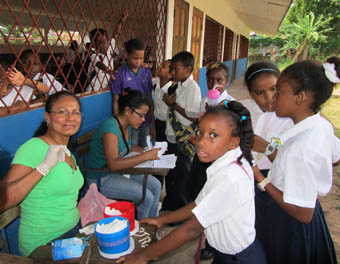
A cooperation project of Universitat de València, which is in the 0,7 Una Nau de Solidaritat framework Programme, allowed the establishment of a control protocol, of an adequate parasitological treatment and of the needed prevention measures in the fight against intestinal parasitism among child population from the islands of Corn Island (Nicaragua), which benefited more than 2,200 boys and girls.
According to the World Health Organization, many medical, social and economical problems from the entire world come from the high influence of parasite diseases. Among them, the intestinal habitat diseases are the most prevalent and cosmopolitan. Besides, they are the most common among the poorest and disadvantaged communities. These diseases are more aggressive yet among school population, where they really wreak havoc. In fact, they can provoke severe intestinal and anaemic problems, growth delay, a death disorder and even death.
Since 1950, every 7th April, which is World Health Day, World Health Organization foundation is commemorated. During such dates, social, scientific and development initiatives are given sense, such as the one Universitat de València accomplished in the Caribbean archipelago. Doctor Carla Muñoz-Antoli, principal professor from the Department of Cellular Biology and Parasitology of the Faculty of Pharmacy at Universitat de València, directed the “Insularity impact on intestinal parasitism of child population from Nicaragua: the archipelago case of Corn Island” project, with this, they tried to improve health condition of more than 2,200 underage people from Nicaragua. “Universitat must focus on society by contributing to the improvement of life quality of citizens, to the conservation of the environment and to the co-operation to the development of disadvantaged town”, stated the researcher.
Therefore, in order to complete two of the previous projects directed by Doctor J. Guillermo Esteban, in 2007 and in 2009, which allowed the treatment of child population from departments of Managua, of Río San Juan and of the South Atlantic Autonomous Region (RAAS), Doctor Muñoz-Antoli team planned “to end the study including child population from the islands of Corn Island, which belong to RASS”, said the Universitat de València professor.
The Corn Islands are two islands of an archipelago located on the Caribbean coast, which represents a privileged setting where, although tourism growth, high levels of poverty are kept due to the lack of infrastructures, work and services. All of this contributes to the insulation and discrimination of population.
The Universitat de València project, which had the collaboration of the ‘Luis Felipe Moncada’ Polytechnic Health Institute of National Autonomous University of Nicaragua as a local opposing party, it evaluated the influence of insularity on boys and girls’ health condition from these islands through the analysis of the intestinal parasitology condition. IN this way, relatives and municipals were able to be alerted of the transmission level regarding parasites, as for the gravity of the detected parasites.
Among other achievements, and also thanks to the support of Nicaraguan Ministry of Health, it was proceeded to the adequate therapy regarding to parasites and it inspired an educational process of population in order to be able to adopt preventive measures and in this way to interrupt the transmission of parasites. The main goal is: to improve the health of children and their families from that place
The project, step by step
For the achievement of such goal, a member vocational training from the other side is performed; a scientific expedition to Nicaragua for the sample collection; the analytical processing with etiological techniques of the samples; and the elaboration of a control protocol for the parasitological therapy between Corn Island citizens and many hygienic and sanitary preventive measures.
According to Doctor Carla Muñoz-Antoli, the concrete objectives of the project are “to know the spectrum of responsible intestinal parasites from the alteration of child population health condition until 15 years old; to know the parasitism prevalence in each detected parasite species; to know the intensities of parasitism of the species of detected helminths; to know the possible cases of multi-parasitisms; to establish the epidemiological characteristics of each detected parasite species; to identify risk factors; and to establish the adequate parasitological therapy, as for the appropriate measures for prevention, fight and control of different parasitism”.
Application environment
The scope of application of the project is based on the insular population of Corn Island, in Nicaragua. This country is the second poorest of Latin America, after Haiti.
The most important problems of the insular population are three: health, due to the lack of sanitary facilities and specialized medical staff (that is why, most of the times, ill people go under ancestral healing processes with no scientific bases); education, the difficult access because of low salaries and an overload of work of teachers; and the environment, both in conditions of sustainable access to basic services of sanitary and safe water, as they face severe problems in the manipulation of waste (drainage system does not exist there, for example) and only the 23% of homes receive safe water.
Universitat de València 0,7 Programme
The 0,7 Programme A Nau of Solidarity, which the Internationalization and Co-operation Vice-Principal of Universitat de València will call, is made by the 0’7 Commission created in 1995, with the aim of establishing the general acting lines regarding to co-operation for the development of Universitat de València. It also aims to distribute a 0’7 budget - which can be obtained from the 0’7 of the budget of Universitat, as for voluntary character of the 0’7 of its staff salary and of the students enrolment rates- among the diverse programmes of co-operation; to control and to supervise this budget; and to prepare and resolve the calls of self co-operation projects.
Last update: 5 de april de 2015 07:00.
News release


















